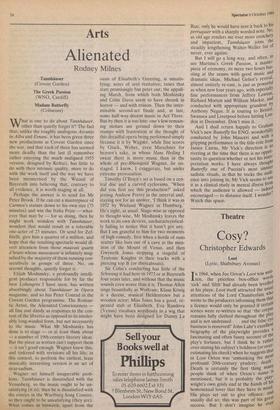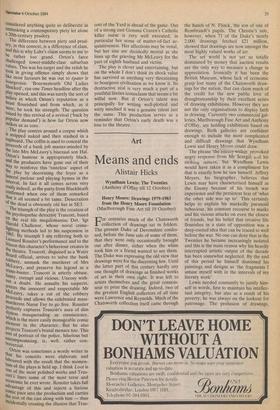Theatre
Cosy?
Christopher Edwards
Loot (Lyric, Shaftsbury Avenue)
I n 1964, when Joe Orton's Loot was vai!" ten, the priceless box-office %Or° 'sick and 'filth' had already been levelled. at his plays. Loot itself attracted the usuai attentions of the Lord Chamberlain whc; wrote to the producers informing them Oa: a licence would only be granted if certain scenes were re-written so that 'the corPse remains fully clothed throughout the PIO and is not undressed . . . and the false eye business is removed!' John Lahr's excellent biography of the playwright provides a fascinating and often funny account of the play's fortunes, but I think he is rather over-stating his subject's boldness (or over' estimating his cheek) when he suggests that in Loot Orton was 'unmasking the mos,t profound 20th-century prudery; death. Death is certainly the first thing mat1,7, people think of when Orton's name I' mentioned, but it is probably the PK- wright's own grisly end at the hands of his homosexual lover that they have in nund,i His plays set out to give offence, an`: usually did so; this was part of his grea` success. But I don't imagine he ever considered anything quite so deliberate as unmasking a contemporary piety let alone a 20th-century prudery. The difference between piety and prud- erY, in this context, is a difference of class, and this is why Lahr's claim seems to me to be rather too grand. Orton's farce challenged lower-middle-class suburban values. This was his target and the relish he took in giving offence simply shows that like most farceurs he was out to epater le bourgeoisie. 'Bournemouth Old Ladies Shocked', ran one Times headline after the Play opened, and this was surely the sort of Milieu in which Orton's reputation as a beast flourished and from which, as it Were, he took his strength. The question raised by this revival of a revival (tack by Popular demand') is how far Orton now strikes us as cosy. The play centres around a corpse which ts stripped naked and then stashed in a cupboard. The coffin is used to conceal the proceeds of a bank job master-minded by the late Mrs McLeavy's bisexual son Hal. °rton's humour is appropriately black, and the producers have gone out of their Way to reinforce this ',tasteless' aspect of the Play by decorating the foyer as a funeral parlour and playing hymns in the interval. In fact it all comes across very cosily indeed, as the party from Blackheath confirmed when one of them remarked that it all seemed a bit tame. Desecration Of the dead is obviously old hat in SE3. The triumph of the play is the creation of the psychopathic detective Truscott, based °t1 the real life megalomaniac Det. Sgt Harold Challenor, whose novel crime- fighting methods led to his suspension in ,1965. By triumph I am referring both to ronard Rossiter's performance and to the sson this character's behaviour creates in !site theatre. Truscott, disguised as a Water ooard official, arrives to solve the bank robbery, unmask the murderer of Mrs 14cLeavy, and preserve his legend as a cfrirne-buster. Truscott is utterly obtuse, "IV, corrupt and vicious. Uncosy with- °Itt a doubt. He assaults his suspects, a, !rests the innocent and respectable Mr McLeavy, takes a cut of the robbery
Proceeds and allows the celebrated mass-
tnurderess Nurse Fay to go free. Rossiter Perfectly captures Truscott's aura of dim slYness masquerading as omniscience, which is the more easily manageable comic element in the character. But he also Projects Truscott's brutal menace too. This Snort of portrait of the police, hilarious but ' 'flcoMpromising, is, well, rather con- troversial.
Orton was sometimes a wordy writer in that his conceits were elaborate and Laboured with the result that the momen-
tum of the plays is held up. I think Loot is °ne of the most polished works and Trus- cows lines some of the most terse and economic he ever wrote. Rossiter takes full advantage of this and injects a furious ecbulic pace into the production and carries the rest of the cast along with him — thus Incidentally creating the illusion that Trus-.
cott of the Yard is ahead of the game. Out of a strong cast Gemma Craven's Catholic killer nurse is very well executed, in particular her, sense of matter-of-fact ac- quisitiveness. Her affections may be venal, but her sins are decidedly mortal as she lines up the grieving Mr McLeavy for the part of eighth husband and victim.
The play is clever and entertaining, but on the whole I don't think its shock value has survived as anything very threatening to bourgeois civilisation as we know it. Its destructive zeal is very much a part of a youthful Sixties iconoclasm that seems a bit wilful now. But if Orton's talent was principally for writing well-plotted and witty mischief it was a genuine talent just the same. This production serves as a reminder that Orton's early death was a loss to the theatre.















































 Previous page
Previous page